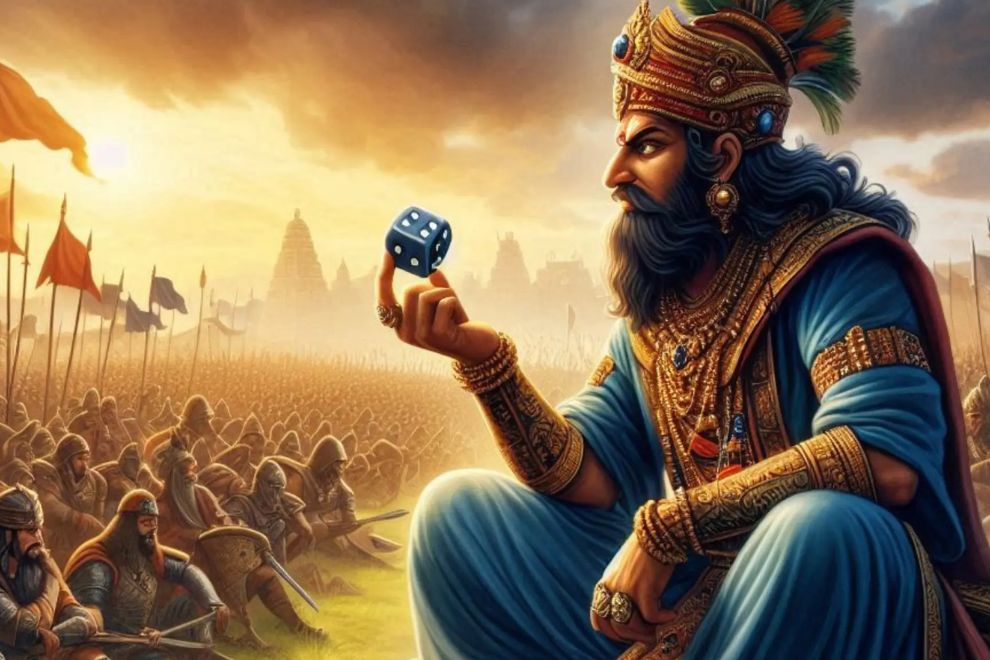Mastermind or Menace?
In the vast moral ocean of the Mahabharat, few characters stir as much debate as Shakuni, the prince of Gandhara. Some see him as the scheming villain who led the Kauravas to ruin. Others view him as a brilliant tactician, playing the only hand he had in a game rigged against him.
So, was Shakuni a strategist—fighting with intellect where others used weapons? Or was he a manipulator, using influence to twist morality for revenge? The truth lies in the gray space between strategy and ethics.
🧠 Who Was Shakuni? The Man Behind the Dice
Shakuni, the maternal uncle of Duryodhana, is often painted as the architect of the Kurukshetra War. A master of dice, words, and deception, he shaped events that eventually led to the fall of the Kuru dynasty.
But behind his cunning was a deeper story: the humiliation and mistreatment of his family by the Kuru court. Many believe his manipulations were born from revenge—strategic, deliberate, and fueled by historical injustice.
🧩 Strategy or Manipulation: What’s the Difference?
In modern terms, strategy implies planning with a goal, while manipulation often means bending others’ will for personal gain.
Let’s break it down:
| Trait | Strategy | Manipulation |
|---|---|---|
| Purpose | Long-term impact, outcome-driven | Self-interest, revenge, control |
| Ethics | Transparent, even if tactical | Deceptive, hidden motives |
| Result | Empowerment or problem-solving | Dependence, chaos, or betrayal |
Shakuni’s actions—rigging the dice game, exploiting Duryodhana’s envy, and pushing for war—blur this line. They were strategic, yes, but also ethically questionable.
🔥 Shakuni’s Influence: Intent or Instigation?
Shakuni didn’t kill anyone directly. He didn’t wield a sword. But his weapon was influence, and he used it with precision:
- He fueled Duryodhana’s insecurities.
- He orchestrated the infamous dice game, stripping the Pandavas of dignity and kingdom.
- He normalised revenge as a political strategy.
Was this wisdom in warfare—or calculated manipulation of weak minds?
📜 The Mahabharat’s Ethical Question: Ends vs. Means
Shakuni forces us to confront an uncomfortable truth:
Is it okay to manipulate a broken system for revenge or justice?
The Mahabharat doesn’t offer simple answers. It shows how righteous causes can lead to unrighteous paths when influenced by obsession.
Shakuni may have believed he was righting a wrong—but his method caused generational destruction.
🧭 Modern Relevance: Shakuni in Today’s World
In today’s world of media spin, psychological warfare, and political games, Shakuni archetypes still exist:
- Leaders who use fear and bias to divide.
- Influencers who trade truth for virality.
- Thinkers who strategize not for progress, but for personal power.
The Mahabharat invites us to ask: Are we following strategy—or are we being manipulated?
🧘 Final Thoughts: Influence Without Integrity is a Curse
Shakuni’s legacy is a cautionary tale. He wasn’t just a villain—he was a master of the mind, who understood human weakness too well. But without ethical boundaries, intelligence becomes poison.
Let his story remind us:
Strategy without dharma (righteousness) becomes manipulation.
And influence without empathy becomes destruction.
In the end, Shakuni won the game—but lost the war.
Choose your strategy wisely.




